The Federal Government has entered into partnership with Shelter Afrique Development (ShafDB) to deliver 5000 housing units as part of effort to provide housing for Nigerians.
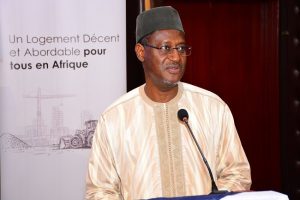
The Federal Government has entered into partnership with Shelter Afrique Development (ShafDB) to deliver 5000 housing units as part of effort to provide housing for Nigerians.

The Nigerian National Petroleum Company Limited (NNPC) has provided updates on its crude oil exploration activities in the Northern part of the country, reiterating its commitment to achieving the Federal Government’s aspirations in the frontier basins.

“The company has been actively drilling in basins in and around Northern Nigeria, as a result of the need to increase oil exploration in the country’s frontier basins”.
This was contained in a publication authored by the Chief Corporate Communications Officer, NNPC Ltd, Olufemi Soneye, who noted that “this is a strategic engagement that NNPC Ltd will not compromise on.”
Soneye pointed out that the NNPCL is intensifying its patriotic efforts, making significant progress, and advancing considerable prospects to make do its promises to Nigerians.
Soneye added that the discovery and exploration of crude oil in the north will not only appear as a dream pursued, but as an economic reality to boost oil production as well as deepen the strength and efficiency of the petroleum industry value chain in Nigeria.
He said: “NNPC Ltd, in compliance with the Petroleum Industry Act, PIA, is leaving no stone unturned to continue oil drilling projects in the North after decades of exploration in other basins.
“With crude oil reserves of more than 37 billion barrels and the 6th largest world producer, the discovery of hydrocarbon deposits in the Kolmani River II Well on the Upper Benue Trough, Gongola Basin, in the north eastern part of the country will only accentuate the prosperity and growth of Nigeria in the comity of nations.
“It is therefore untrue for naysayers or sceptics to claim that NNPC has halted the search for oil in Nigeria’s inland basins. On the contrary, NNPC Ltd is intensifying its patriotic efforts, making significant progress, and advancing considerable prospects to make do its promises no matter whose ox is gored.”
While stating that the NNPC Ltd would not suspend its inland basins oil and gas exploration activities, as some have suggested, he quipped that “Instead, the company is intensifying efforts to expedite the process and ensure the efficient exploitation of hydrocarbon resources in these areas, thereby contributing to national energy security.
The Nigerian National Petroleum Company (NNPCL) has assured that contrary to insinuations in some quarters, oil exploration in the northern of the country is on course.
Olufemi Soneye, Chief Corporate Communications Officer (CCCO) of NNPC Limited, made this clarification in a recent publication noting that the company in compliance with the Petroleum Industry Act (PIA) 2021, is leaving no stone unturned to continue oil drilling projects in the North after decades of exploration in the South.
He emphasised that the company is currently active in the inland basins of Nigeria with some drilling projects including Wadi-2 Appraisal/Exploratory Well in OPL 732 and Ebenyi-1 Exploration Well in OPL 826.
According to him, the Wadi-2 Appraisal/Exploratory Well in OPL 732 in Borno State, within the Chad Basin, was spudded on November 4, 2023, and drilled to a total depth of 12,050 feet.
He noted that the drilling phase concluded on June 29, 2024 and the preliminary results from the geological evaluation of the well objectives led to post-drilling well testing, which began on July 4, 2024, and is ongoing.
“This testing aims to further evaluate the target reservoirs for the occurrence of a commercial accumulation of hydrocarbons and to obtain data for future field development,” he stated.
On Ebenyi-1 Exploration Well in OPL 826, which is situated in Nasarawa State within the Middle Benue Trough, drilling began on July 17, 2023.
“The 17½” hole section was drilled and cased to a depth of 3,449 feet. The drilling operations faced challenges due to issues with the hole and equipment breakdowns. The turnkey contractor is finalising plans to replace the drilling equipment with newer models to continue drilling operations to the planned total depth of 14,250 feet, ” Soneye stated.
On the Kolmani River where in 2019 1 billion barrels of oil reserves and 500 billion cubic feet of gas was discovered, Soneye said the defunct Frontier Exploration Services (FES) of NNPC Ltd drilled three wells—Kolmani River-2, Kolmani River-3, and Kolmani River-4—in the Upper Benue Trough (northeast Nigeria) on its and its partners behalf.
He said the drilling campaign confirmed the presence of commercial hydrocarbon deposits in the Kolmani field of OPLs 809 and 810.
He noted that the rig that drilled the wells was subsequently moved to start the Nasarawa project, with the goal of replicating the success achieved in the Kolmani field.
“In collaboration with co-venturers, we are working towards the next phase of field development. The post-exploration planning takes time to meet regulatory requirements before the development phase can commence. Significant infrastructure projects are currently underway to facilitate the movement of heavy-duty equipment for the next project phase in the area.
“NNPC Ltd has not and will not suspend its inland basins oil and gas exploration activities, as some have suggested. Instead, the company is intensifying efforts to expedite the process and ensure the efficient exploitation of hydrocarbon resources in these areas, thereby contributing to national energy security,” Soneye stated.
The NNPC Ltd. spokesman said the current leadership of the company is committed to addressing every gap within its purview including infrastructural issues associated with the oil and gas industry such as gas shortages for power supply, pipeline protection and maintaining the uninterrupted provision of petroleum products across the country.
“For clarity, the NNPC Ltd, under the chairmanship of Chief Pius Akinyelure and managerial leadership of Mele Kyari, is well-positioned to capture the economic opportunities associated with developing and selling hydrocarbons in a resource rich country like Nigeria. These benefits are to be equitably distributed across society and create wealth for human capital development and capacity building.
“It is to further achieve this sufficiency that, under Kyari’s leadership, NNPC Ltd is fully aligned with the federal government’s ambition to accelerate economic growth and diversify the economy for the benefit of all Nigerians.
“This is being achieved through timely, credible, clear, and consistent policies. Since taking charge in July 2019, he has driven significant organisational renewal and greatly improved NNPC’s performance and long-term viability. The board and Kyari have been the driving force behind ambitious business growth and have instilled a new commercial mindset throughout the company’s entire value chain, ” Soneye said.
He said Kyari’s leadership style has revitalised NNPC Ltd. workforce even as the company continues to attract the interest of business partners, customers, suppliers, and shareholders noting that since its transition to a commercial entity under the Petroleum Industry Act (PIA) 2021, and in line with the Company & Allied Matters Act (CAMA) provisions, NNPC Ltd. has consistently delivered value despite its unique operational challenges.
Soneye said in addition to thus, the company hsd maintained steady growth.
“For the first time in 43 years, NNPC declared a profit. From a loss of N803 billion in 2018, the company reduced this to just N1.7 billion in 2019. Remarkably, in 2020, NNPC posted its first-ever profit of N287 billion, which grew to N674.1 billion in 2021, and by the end of 2022, it had soared to N2.548 trillion.
“In our 2023 Audited Financial Statement, AFS, we declared a net profit of N3.297 trillion for the fiscal year, indicating an increase of 28 percent (over N700 billion) compared to the N2.548 trillion recorded in 2022. The N3.297 trillion profit declared for 2023 is very symbolic as it is the highest ever to be recorded since inception, 46 years ago.
“In terms of asset growth, we have moved from N13,300 billion in 2019 to N15,836 billion in 2020; N16,262 billion in 2021; N58,652 billion in 2022; and N246,816 billion, in 2023,” the NNPC spokesman said.
He added that NNPC Ltd. would continue exploration in the north so that it can sustain this type of excellent financial performance and gains for its investors and Nigerians at large noting that “the more strategic explorations we make, the better for all of us.”
Malawi, serving as the Chair of the Least Developed Countries (LDC) Group on Climate Change, will host the LDC Strategy & Ministerial Meetings from August 26 to 28, 2024, at Bingu Wa Mutharika International Convention Centre (BICC).
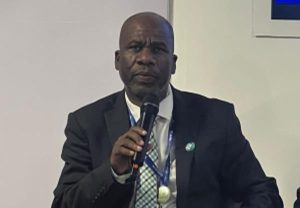
The crucial and timely gathering will unite high-level representatives, including ministers, climate negotiators, and experts from the LDCs, marking a significant step in the global climate dialogue.
Under the theme “Uniting for 1.5°C – Aligned Climate Action and Resilient Futures,” the meeting will focus on reviewing progress in international climate negotiations, addressing critical issues, and crafting strategies to ensure impactful engagement at COP29 in Baku, Azerbaijan. Participants will align on priorities, set goals, and explore future strategies while building support for LDC-led initiatives.
The meeting follows a technical strategy session held in March in Lilongwe and the 60th UNFCCC Subsidiary Bodies (SB 60) sessions in Bonn, Germany. The leaders will tackle highly important topics such as the New Collective Quantified Goal on Climate Finance (NCQG), the remaining rules on Article 6 on carbon trading, mitigation outcomes for COP29, financing to address loss and damage, and common position on matters related to the Global Goal on Adaptation (GGA).
Evans Njewa, Chair of the LDC Group, highlighted the meeting’s significance.
“This gathering represents a crucial moment in our unified efforts to achieve an ambitious outcome at COP29. Our goal is clear: to set an ambitious new goal for climate finance that reflects the needs of our countries, to limit global temperature rise to below 1.5°C and bolster resilience in our most vulnerable nations,” he said.
Njewa stressed the LDCs’ commitment to impactful action: “The outcomes of this meeting will be instrumental in shaping our collective positions and priorities moving forward. The Lilongwe meeting will play a key role in setting a unified agenda for the LDCs, strengthening our negotiating stance at COP29, and advancing towards a sustainable and resilient global climate framework.”
Highlights of the meeting will culminate into the Lilongwe Declaration, accompanied by a detailed report and follow-up plan, reflecting positions informed by latest climate science, the needs of LDCs and the overall outcomes of the Global Stocktake (GST).
The declaration will be shared with participants and relevant LDC representatives to ensure a unified approach at COP29, aiming to raise ambitions and address the urgent need for financial support for the most vulnerable countries.
The Least Developed Countries (LDCs) Group consists of 45 nations spanning Africa, the Asia-Pacific, and the Caribbean, representing over one billion people. These countries, highly susceptible to environmental and economic shocks and disproportionately impacted by the climate crisis, come together as a united bloc at UN climate talks.
The Group’s collective aim is to advance a fair and ambitious global response to climate change, addressing our shared vulnerabilities and striving for equitable solutions.
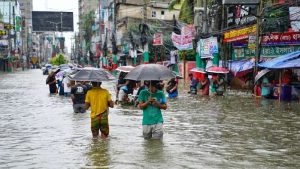
At COP29, scheduled to be held in Baku in November 2024, Azerbaijan will call for a global ceasefire, Elnur Soltanov, Deputy Minister of Energy of Azerbaijan and CEO of COP29, said in an interview with Anadolu Agency.

Soltanov stated that climate change will be the main focus of COP29: “Developed countries will also show more support to developing countries, which will be on the agenda of COP29. Climate change affects Africa the most.”
The CEO noted that Armenia has also been invited to COP29: “We will have approximately 80,000 guests. Invitations have been sent to all the presidents of the world. Ministers from more than 50 countries will attend, and this number is expected to increase.”
“COP29 will be an event unlike any other hosted by Azerbaijan. We will lead the climate debate and showcase Azerbaijan’s hospitality. COP is unlikely to fail,” he said.
Dr. Nariman Pashayev, head of the Department of Economics and Geography at the Institute of Geography, in an interview, emphasised that Azerbaijan must take substantial measures to combat climate change.
“Global climate change affects people’s lives and economic activities. If drought occurs in one area, floods, landslides, and mudslides happen in another. People try to adapt to these changes, but currently, there is a global drought prevailing worldwide,” stated Dr. Pashayev.
He believes that hosting COP29 in Azerbaijan can boost efforts to address climate change. “The COP event, previously held in various countries, will take place in Azerbaijan this November. Until now, developed countries have been fighting climate change, and we started in 2015. COP29 is of great importance for Azerbaijan as it can increase attention to processes such as soil protection, restoration of geological diversity, and creation of water basins, ultimately enhancing people’s care for the environment,” he added.
The geographer noted that the consequences of climate change are clearly visible in Azerbaijan. “The greatest impact has been around the Caspian Sea, where the sea has receded by at least 200 meters from Samur River to Astara River, with some areas experiencing a 300-meter retreat. The effects of drought are evident in Azerbaijan, and the water level in the Kura River has also decreased, although this year’s heavy rainfall has slightly increased the water level,” he explained.
Dr. Pashayev emphasised the need to adhere to the provisions of the Paris Agreement, with the main goal being to keep the 1.5°C target within reach and not to overlook any country, especially COP participating countries.
“The environment is extremely polluted, causing rising temperatures. Glaciers in the Arctic, Antarctic, and Caucasus are already melting. The Paris Agreement is crucial for Azerbaijan, as every piece of waste and carbon emission hinders longevity. Countries must understand that the world is united, and everyone should protect their territory with care, fighting pollution together. So far, 28 such conferences have been held. Now it is held in Azerbaijan.
“COP measures show that everyone should protect their territory with care. There should be a joint fight against pollution. We have also supported the Paris Agreement and took obligation in this regard. By 2030, we must reduce pollution and the amount of waste. This reduction should be achieved by at least 35 percent. These are massive issues. They take long research and hard work,” he stressed.
The department head also highlighted that one of COP29’s most significant achievements will be the transition to alternative energy. “Azerbaijan heavily relies on oil and gas, while some countries use coal. However, these resources are depleting, necessitating a shift to alternative energy sources such as solar, wind, water, and tidal energy, which are clean and inexhaustible. Azerbaijan has committed to using 30% alternative energy by 2030, currently at 7-10%, with the potential to increase it to 80% in Nakhchivan and Karabakh,” he noted.
Dr. Pashayev emphasised that increasing the number of recycling plants in Azerbaijan is essential to reduce pollution and maintain a stable global temperature. “All production facilities should minimise waste discharged into the environment, and extensive training should be provided. Baku has only one waste recycling plant, while valuable raw materials are discarded daily. Each region should have at least one waste recycling plant to meet our needs. Thanks to those plants, waste must be reprocessed. In this regard, COP29 will create the foundation for the creation of new jobs worldwide,” he concluded.
A university don has advocated a law to make the local refining of crude oil mandatory to check supply shortages and to improve the economy of the country.
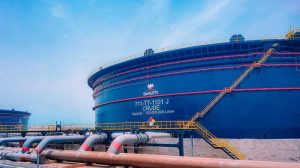
Prof. Abdullahi Dan’Asabe-Jibrin, Dean, Faculty of Social Sciences, Federal University of Lafia (FULafia), made the call at the 3rd Seminar of the faculty, on Wednesday, August 21, 2024, in Lafia, Nasarawa State.
Dan’Asabe-Jibrin, Professor of Political Economy and Development, spoke on: “Nigeria State and Oil Sector: A Trajectory of Power, Politics and Poverty”.
He explained that at the moment crude oil was produced in nine out of the 36 states in the country with five core states accounting for more than two-thirds of the production.
He listed the states to include Abia, Akwa-Ibom, Bayelsa, Cross-River, Delta, Edo, Imo, Ondo, and Rivers.
He added that the Niger Delta Basin was the largest producer along the West African coast with 246 production fields and 3, 446 active wells.
“How can Nigeria, which is one of the largest oil-producing countries in Africa and with enormous potential, rely on foreign refineries for its domestic consumption?” he said.
According to him, the government should fix the refineries in the country and ensure that the four refineries operate optimally.
He explained that if the Dangote refinery was producing and the four government refineries were also working, it would guarantee the availability and affordability of petroleum products in the country.
“Dangote refinery alone can produce petroleum products for domestic consumption and exports,” he added.
Dan’Asabe-Jibrin suggested that governments should build modular refineries and give private investors the licence to build more to meet the energy needs of Nigerians.
The professor called on the government to fight corruption, which was major impediments in the oil sector and return fuel subsidies to reduce the hardship being faced by the people.
In his remarks, Prof. Shehu Abdul-Rahman, Vice Chancellor (VC) of the university, said that the seminar series was introduced to enable researchers to share knowledge to address societal problems.
Abdul-Rahman encouraged other researchers to investigate more and provide theories and practical solutions to the contemporary challenges confronting the country to help those in positions of authority.
The Vice-Chancellor promised that the institution would reward the faculties and departments that performed best in academic activities and encouraged all in attendance to utilise the takeaways from the seminar.
By Sunday John
Members of the Rivers State House of Assembly have pledged to strengthen environmental laws and equip state institutions to effectively manage flood disasters.

Mr Timothy Orubienimigha, the Deputy Speaker, stated this during a public hearing at the committee stage of the Rivers State Emergency Management Agency Bill 2024.
Stressing the importance of the bill, Orubienimigha said that it would create a comprehensive framework that would help address emergencies and minimise impacts when eventually passed.
Dr. Nwiyor Jerry, President, Society of Professional Disaster Risk Management of Nigeria, a participant at the session, commended members for prioritising the bill which also seek to address the challenges of flooding.
He advised the lawmakers to ensure that the provisions of the bill were in harmony with that of the National Emergency Management Agency (NEMA), so as to avoid incompatibility and duplication of duties.
Dr Diamond Tamunokuro, Chairman, Rivers chapter of the Nigerian Medical Association, in his contributions, commended the lawmakers for initiating the bill at the peak of the rainy season.
He urged them to accelerate passage of the bill to enhance an effective management of the 2024 flood as already predicted by NiMet
The Rivers State Emergency Management Agency Bill 2024 is a private bill which seeks to provide for the establishment of the Rivers State Emergency Management Agency.
Representatives of the civil society groups, professional bodies and the labour unions also participated in the session.
By Ikuru Lizzy
Hundreds of wildfires are currently raging across Canada, with over 800 active fires, 223 of which are out of control.
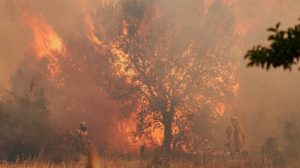
According to the latest report from the Canadian Interagency Forest Fire Centre (CIFFC) dated Monday, August 19, 2024.
Meanwhile, scientists note that this year’s fires are unusually widespread, affecting regions from the West Coast to the Atlantic Provinces in the east and northern Canada.
The flames have also affected the tourist hotspot Jasper National Park in western Canada, where fires have been burning for weeks.
Due to the wildfire activity, the national park, a UNESCO World Heritage Site in the Canadian Rocky Mountains, is currently closed to visitors, the park’s website stated.
Furthermore, all camping reservations up to September 3 have been cancelled.
The fires have affected an area of more than 33,000 hectares.
Following an evacuation order almost a month ago, residents were only able to return to the town of Jasper last Friday for the first time.
Nearly a third of the town’s structure has been destroyed by the fires.
Photos showed entire residential areas consumed by the flames.
In addition to the rubble of houses, burnt-out cars and charred trees were visible.
“It feels like you’re part of an apocalypse or a war zone,” a resident was quoted as saying.
Meanwhile, last year, Canada was hit by wildfires on an unprecedented scale.
It was the most destructive ever recorded, according to Natural Resources Canada.
By the end of 2023, more than 6,000 fires had burned about 15 million hectares of land, an area larger than England.
Typically, Canada loses around 2.5 million hectares annually to wildfires.
Given climate change, experts warn that fires are becoming more frequent and destructive.
President Bola Tinubu has condoled with the Jigawa State Government and the people of the state over the recent flooding that led to the loss of lives and displacement of many citizens.
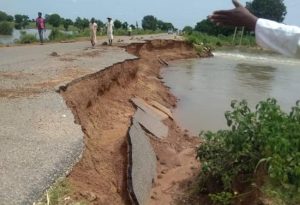
In a statement on Wednesday, August 21, 2024, by his spokesman, Chief Ajuri Ngelale, the president also commiserated with the bereaved families and victims of the flooding, which impacted 14 local government areas and many households.
“President Tinubu states that recurring environmental disasters underscore the urgency of sustaining measures to address climate change and its perils as well as remove man-made elements to the challenge.
“The President prays for the repose of the souls of the deceased and assures the people of Jigawa of his administration’s support at this difficult time,” Ngelale said.
In a related development, Dr Moses Adejo, a seasoned agronomist, has raised the alarm that the recent floods in Bauchi State have not only destroyed crops but also affected soil fertility and disrupted farming schedules.
Adejo, who raised the alarm in an interview on Wednesday in Bauchi, the state capital, said the floods also increased the risk of pests and diseases in farming schedules.
According to him, farmers must act quickly by assessing the damage promptly and accurately and removing debris and silt from affected areas to mitigate the effects of the floods.
“They should apply organic matter to restore soil fertility, consider replanting flood-tolerant crops, and monitor pests and diseases.
“Farmers should take advantage of flood-tolerant crop varieties, such as rice and maize, which can thrive in waterlogged conditions,” he advised.
He also recommended that farmers adopt conservation agriculture practices, such as mulching and contour farming, to reduce soil erosion and improve soil health.
Adejo also offered emotional support to farmers who have lost their livelihoods to the floods.
“We understand the emotional toll of losing one’s farm, and we are here to support farmers every step of the way,” he said.
By Salif Atojoko and Ahmed Kaigama